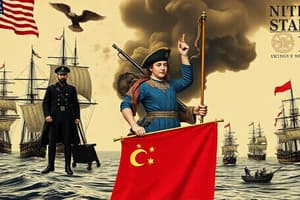Podcast
Questions and Answers
What was the greatest logistical headache for the fleet according to the passage?
What was the greatest logistical headache for the fleet according to the passage?
- Finding and securing sources of oil (correct)
- Refuelling at sea
- Subjecting everyone to extreme discomfort
- Robbing the ship's company of their brief period of rest
According to Churchill, what were the advantages of oil over coal as a fuel for the fleet?
According to Churchill, what were the advantages of oil over coal as a fuel for the fleet?
- Smaller boilers and greater travel distance
- Less smoke and greater speed
- More efficient design of ships and reduced manpower need
- All of the above (correct)
Why did Lord Selborne consider the substitution of oil for coal impossible?
Why did Lord Selborne consider the substitution of oil for coal impossible?
- Oil burns with less smoke and can be stored in tanks anywhere
- Oil requires smaller boilers and ships to travel twice as far
- Oil does not exist in sufficient quantities in the world (correct)
- Finding and securing sources of oil was difficult
Who was a key supporter of oil as fuel for the fleet and was renowned for many innovations in administration and engineering?
Who was a key supporter of oil as fuel for the fleet and was renowned for many innovations in administration and engineering?
What did Admiral Fisher consider to be a 'gospel fact' in 1902?
What did Admiral Fisher consider to be a 'gospel fact' in 1902?
What was the primary source of power for naval vessels when Churchill went to Whitehall in 1911?
What was the primary source of power for naval vessels when Churchill went to Whitehall in 1911?
What technological change was a great success in naval operations?
What technological change was a great success in naval operations?
Why did the Royal Navy stimulate the transition from coal to oil?
Why did the Royal Navy stimulate the transition from coal to oil?
What was one of the disadvantages of using coal as a fuel for naval vessels?
What was one of the disadvantages of using coal as a fuel for naval vessels?
What was the preferred type of coal mined in Wales and widely used by navies worldwide?
What was the preferred type of coal mined in Wales and widely used by navies worldwide?
Flashcards are hidden until you start studying
Study Notes
Logistical Challenges and Fuel Transition
- The greatest logistical headache for the fleet was managing the supply of coal.
- Churchill identified oil as advantageous over coal due to its higher energy density, efficiency, and reduced space requirements on ships.
Opposition to Oil as Fuel
- Lord Selborne deemed the substitution of oil for coal impossible due to the lack of necessary infrastructure and technological readiness at the time.
- A key supporter of oil as fuel was Admiral Fisher, known for his innovations in administration and engineering.
Historical Perspectives and Power Sources
- In 1902, Admiral Fisher referred to the superiority of oil as a "gospel fact" regarding fuel for naval operations.
- When Churchill took office in Whitehall in 1911, coal was still the primary source of power for naval vessels.
Technological Advancements and Royal Navy Initiatives
- The transition from coal to oil marked a significant technological advancement that enhanced naval operations.
- The Royal Navy encouraged the switch from coal to oil to improve operational efficiency and reduce logistical burdens.
Disadvantages and Preferred Coal Type
- One disadvantage of using coal as fuel for naval vessels was the considerable amount of ash and smoke produced, resulting in operational challenges and visibility issues.
- The preferred type of coal mined in Wales was known for its quality and became widely used by navies across the globe.
Studying That Suits You
Use AI to generate personalized quizzes and flashcards to suit your learning preferences.



